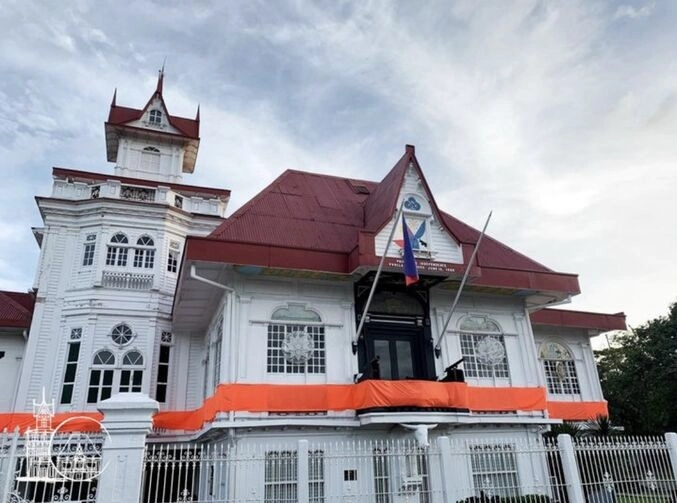
Called the House of History, Emilio Aguinaldo Shrine in Kawit, Cavite is the place where the historic declaration of Philippine independence was publicly read by its author Ambrosio Bautista at the front window of the grand hall on June 12, 1898.
This house is the center of unfolding Philippine history. Its hidden compartments for documents and weapons, concealed doors, camouflaged shelves, secret passageways, tunnels, and its overall structure leave a mark on the sanctity of the house of Filipinos at the beginning of a new century and a revolution that gave the world Asia’s first republic.
It was during this declaration of Philippine independence that the Philippine flag, sewed in Hong Kong by Marcella Agoncillo, Lorenza Agoncillo, and Delfina Herbosa de Natividad, was first officially raised as the local marching band of San Francisco de Malabon — now called General Trias — played Julian Felipe’s composition, “Marcha Filipina Magdalo” — now the Philippine National anthem.
In 1845, Aguinaldo Shrine was constructed using nipa and wood materials. It was reconstructed using a variety of Philippine hardwoods after four years. A major renovation happened in the 1920s when the tower and balcony were constructed. In that year, the house was renovated with architectural details of nationalistic themes: art nouveau, art deco artistic style, and masonic symbols, that were popular during the early 20th century.
Meanwhile, Proclamation No. 374, issued on March 6, 1965, declared May 28 of each year as the National Flag Day, to commemorate the date when the Philippine flag was first unfurled after the historic ‘Battle of Alapan’ in Imus, Cavite in 1898.
Fast forward to 1963, “to perpetuate the spirit of the Philippine Revolution of 1896 that put an end to the Spanish colonization of the country,” Gen. Emilio Aguinaldo donated the mansion and its lot to the Philippine Government.
In 1964, President Diosdado Macapagal issued Republic Act No. 4039 declaring the property a national shrine and placing it under the care of the National Museum of the Philippines.
In 1972, Executive Order No. 370 transferred the shrine under the care and maintenance of the National Historical Commission of the Philippines. A few days before the 146th birth anniversary of Aguinaldo, it was reopened as a museum.
As a matter of fact, Aguinaldo himself designed his mansion and divided it into the main house, family wing, and lookout tower areas. It has seven levels, including the mezzanine and turret.
The ground level has a museum that reveals the role of Cavite during the revolution, including the life of Emilio Aguinaldo, the state of Cavite during the Spanish colonization, the revolution against Spain, and the aftermath of the revolution until the war against the United States.
The conference room, Azotea, grand hall, kitchen, notable mesa altar, large dining table, Ah Tay bed, and secret compartments can be seen on the second level. There’s also a bomb shelter to help the general escape to the nearby church or cemetery by going through a tunnel.
One hundred twenty-six years have passed, yet this mansion still shows a clear glimpse of Filipinos who fought to make the Philippines free from the colonizers. Museum shrines like the Aguinaldo Shrine are a constant reminder that they’re significant to the national landscape and are a big part of history.
The remaining displays in the Aguinaldo Shrine, such as the preserved artifacts and tangible objects that survived the century, are significant turning points that serve as shreds of evidence of our glorious past. These are the silent witnesses in the unfolding of the historic declaration of Philippine Independence.
Be part of our vibrant Good News Pilipinas community, celebrating the best of the Philippines and our global Filipino heroes. As winners of the Gold Anvil Award and the Lasallian Scholarum Award, we invite you to engage with us and share your inspiring stories. For stories Making Every Filipino Proud, reach out to GoodNewsPilipinas.com via Facebook, Twitter, Instagram, TikTok, YouTube, and LinkedIn. LinkTree here. Let’s spread good news together!
The post Aguinaldo Shrine in Kawit: Unfolding Philippine History appeared first on GoodNewsPilipinas.com.

0 Comments